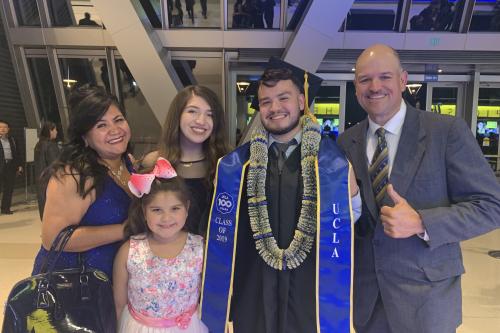
‘You belong’: How first-gen students have succeeded in STEM
UCLA prides itself on the fact that nearly a third of its undergraduate students will be the first in their families to earn a four-year college degree. Still, navigating the university experience can be a challenge for many first-generation students, and particularly for those in STEM fields, where they remain widely underrepresented.
One of the first things these students should recognize is that they’re not alone, says Carlos Galván, a STEM doctoral student. “There are resources on campus, but you have to put yourself out there and be willing to reach out for help.”
Here, Galván and other students and faculty members from the Eli and Edythe Broad Center of Regenerative Medicine A field focused on developing and applying new therapies and techniques to repair, replace or regenerate tissues and organs and restore function that has been lost due to aging, disease, injury or genetic defects. Regenerative Medicine A field focused on developing and applying new therapies and techniques to repair, replace or regenerate tissues and organs and restore function that has been lost due to aging, disease, injury or genetic defects. and Stem Cell Research at UCLA share their experiences as first-generation STEM students for National First-Generation College Celebration Day and National STEM Day. Their stories touch on familiar struggles — from dealing with financial hardships and “imposter syndrome” to the burden of “making it” for one’s family — and offer encouragement and advice on how first-gen students can make the most of their academic journey.
Song Li
Professor and chair of bioengineering, UCLA Samueli School of Engineering
Professor of medicine, David Geffen School of Medicine at UCLA
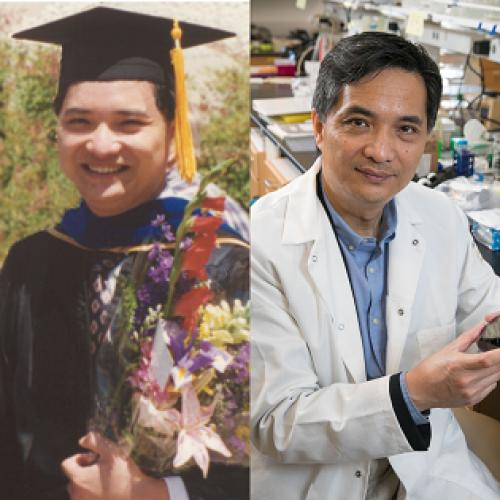
Alma mater: Peking University (bachelor’s in mechanics and master’s in biomechanics) and UC San Diego (doctorate in bioengineering)
Hometown: Liuzhou, China
Song Li grew up in China in the 1960s, a period in which there was significant disruption in the higher education system as a result of the Cultural Revolution. After the country began to reform and reopen in the 1980s, Li gained admission to Peking University, where he earned his bachelor’s and master’s degrees. In the early 1990s, he moved to the U.S. to further his graduate studies.
What challenges did you face as a first-generation student?
My parents encouraged me to pursue higher education, but I had no clue about college life and future opportunities. I was overwhelmed my first year and was juggling many activities and contending with various challenges. However, I gradually learned to manage my time and focus on my classes, and I found my passion for doing research. To relieve the financial burden, I worked as a private tutor during summers to make money for traveling expenses, graduate school tests and school application fees.
What advice do you have for other first-generation students?
The general advice is to pursue a career you’re interested in and good at. I recognize, though, that first-generation college students might face additional hurdles like the lack of mentorship and financial obligations. Still, if you have a dream, go for it, seek advice and find mentors who can help you succeed. Now that I’m in a position to help, I’m eager to promote diversity and inclusion in my lab and classes, and I try to mentor and give career advice to first-generation students the way a parent would.
♦ ♦ ♦
Aileen Nava
Doctoral student in human genetics
UCLA Broad Stem Cell Research Center trainee
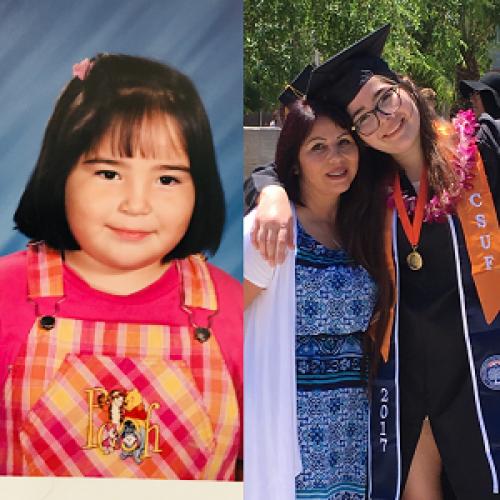
Alma mater: California State University, Fullerton (bachelor’s in biological science, cell and developmental biology)
Hometown: Huntington Beach, Calif.
Aileen Nava’s younger sister suffered a cardiac arrest as a 1-year-old, leaving her disabled and requiring 24-hour medical care. This salient event motivated Nava to excel in school and pursue medical research so that she could one day develop treatments to help children born with congenital defects.
What challenges did you face as a first-generation student?
Money stressed me out the most. I never knew how I was going to pay my tuition each semester. While I received some federal financial aid, it didn’t cover everything. Luckily, my college stepped in and matched the federal funding. I never got a clear answer why this happened from the college financial aid office, but my logic was that since I was getting near-perfect grades, they wanted to keep me there.
I basically lived at the library while also working as a tutor for disadvantaged high school students in Huntington Beach, California, to make money to pay for food and gas. It was incredibly stressful juggling school and work, but I knew that quitting wasn’t an option. It took a lot of caffeine, and I probably suffered negative health consequences as a result. My basic human needs fell to the very bottom of my list of priorities in college because my mom, my sister, my whole family depended on me to “make it.”
What advice do you have for other first-generation students?
Succeeding in academia is less about raw intelligence and more about persistence, in my opinion. My vocabulary, my way of speaking — everything that I've accomplished until now — was all learned. So, even when it starts to feel impossible, know that it’s possible if you put in the work. You just have to find the right people to help you. I didn’t do it alone. At every institution I went to, there were always professors who saw my potential and counseled me through whatever hurdle I was going through.
► See Aileen Nava’s UCLA lab page
♦ ♦ ♦
Amander Clark
Professor and chair of molecular, cell and developmental biology, UCLA College
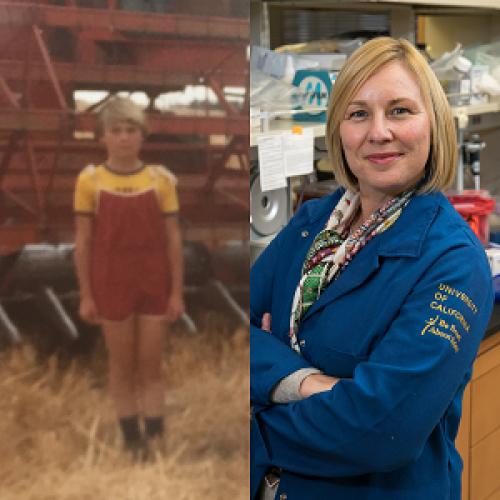
Alma mater: University of Melbourne (bachelor’s in cell and developmental biology, doctorate in cell and developmental biology)
Hometown: Victoria, Australia
Amander Clark says she had an idyllic childhood growing up on a sheep farm in rural Australia, where she spent her time shearing sheep, wheat harvesting and helping with other chores and farm work alongside her two sisters. Her mother was a nurse and her father a farm laborer with a ninth-grade education. Both were supportive of their daughters attending college because they knew it would give them upward mobility.
What challenges did you face as a first-generation student?
I had absolutely no idea what I was doing when I first got to college. I kept expecting at every point along the way for someone to point at me and say, “What are you doing here? You don’t belong.” That imposter syndrome is something I still have today. I think it’s a first-gen thing that sticks with you for a very long time.
As a country kid who never really went to a big city, I was incredibly off-balance my entire first year of university. I felt like I didn’t know anything. I didn’t know anything about art, I didn’t know anything about music. I felt so unprepared to go and live in a city, and I found it very intimidating to be surrounded by all these very smart people who seemed to have a lot more life experience than I did. But my love for learning really helped pull me through those early years of university. I really had a thirst for knowledge and dove into my studies.
What advice do you have for other first-generation students?
There are so many people who came before you that did it and there will be people who come after you whom you can help lift up. You just have to put in the work, but as long as you’re doing your best, you’ll succeed.
► See Amander Clark’s faculty page
♦ ♦ ♦
Carlos Galván
Doctoral student in the molecular biology interdepartmental program
UCLA Broad Stem Cell Research Center trainee
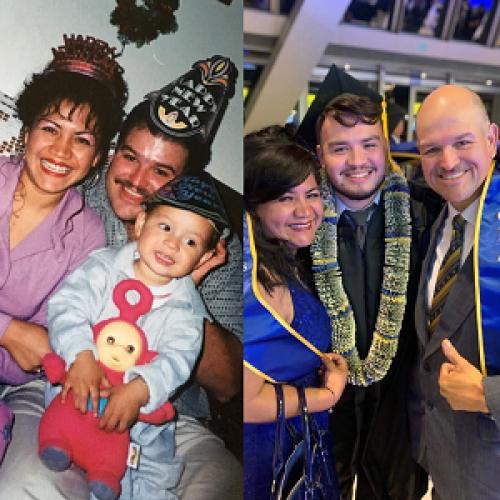
Alma mater: UCLA (bachelor’s in biochemistry)
Hometown: Fontana, Calif.
Carlos Galván credits his immigrant parents’ work ethic with shaping his drive to succeed. As co-president of the UCLA chapter of the Society for Advancement of Chicanos/Hispanics and Native Americans in Science, or SACNAS, he’s passionate about organizing outreach events that expose young people from underrepresented communities to the magic and power of science.
What challenges did you face as a first-generation student?
Transitioning to college and having to be financially responsible for myself was really difficult. I was a full-time student and working multiple jobs. Coming from a low-income background, I had this big inner conflict of trying to balance everything. At one point, I was on the verge of academic probation because I was working so much — that was a huge wake-up call.
I wasn’t able to talk to my family or friends that I’ve known my entire life about my struggles because they wouldn’t understand what I was experiencing. I was also wrestling with thoughts like, “Am I not smart enough? Do I not belong here?” Once I started to join organizations like SACNAS and meet people that looked like me and had similar backgrounds, though — that’s when the imposter syndrome started to die down.
What advice do you have for other first-generation students?
Identify your allies, always advocate for yourself and don’t be scared to ask questions. There are resources on campus, but you have to put yourself out there and be willing to reach out for help. Join organizations like SACNAS to build community with people who have similar backgrounds and can understand your struggles. Above all, have confidence in knowing that you got into college just like your peers, so you belong.
► See a day in Carlos Galvan’s life as a PhD candidate UCLA
♦ ♦ ♦
Pearl Quijada
Assistant professor of integrative biology and physiology, UCLA College
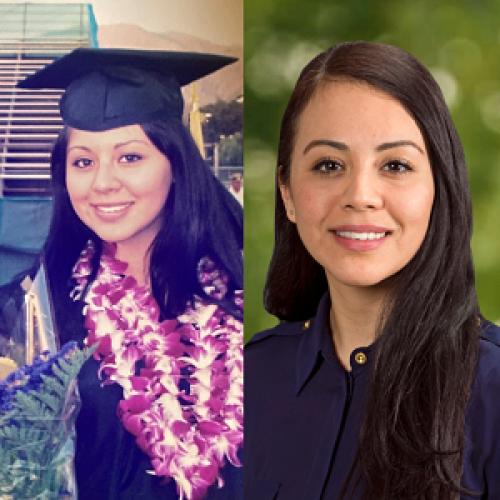
Alma mater: UC Riverside (bachelor's in biology), San Diego State University (master's in cell and molecular biology), San Diego State University and UC San Diego (doctorate in cell and molecular biology)
Hometown: Los Angeles, Calif.
Pearl Quijada was raised by a single mother and is the oldest of four children. A self-described “shy kid” who enjoyed solving puzzles and other activities she could do alone, she credits working in research labs with fostering her love for scientific collaboration.
What challenges did you face as a first-generation student?
The social aspect of college was hard for me. Everyone around me seemed to get it and knew exactly what they were there for. They knew that college wasn’t just about academics — it was about making friendships and joining various student clubs. I don’t know if it’s because I never had exposure to extracurricular activities growing up, but it was difficult to fit in and I felt like an outsider for most of my college experience.
What advice do you have for other first-generation students?
Make sure you’re mentally and physically healthy because burnout is real. Representation makes a huge difference, so I hope that by sharing my background, my students — particularly first-generation students — will feel more comfortable asking me for advice about how to navigate college.
► See Pearl Quijada’s faculty page
Check out UCLA First to Go, a resource hub to assist current UCLA undergraduate students.